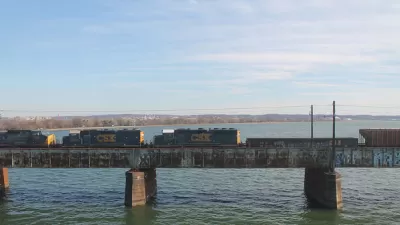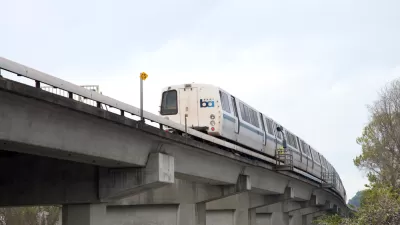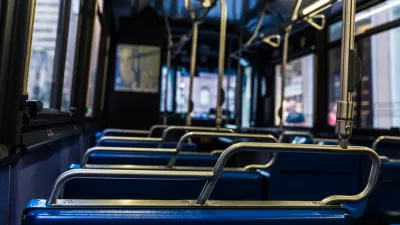More and more people are riding public transit systems, which many officials see as a good sign. But the added strains to the systems are placing many in tight financial situations.
"With gas at $4 per gallon and highway congestion soaring, ridership on the nation's subways and buses has jumped dramatically. Between 1995 and 2006, use of public transportation increased by 30 percent, a rate far outstripping both population growth and increased highway usage. Last year, that meant Americans took some 10.3 billion trips on mass transit. And therein lies the problem. 'There's a transportation finance crisis writ large across the country,' says Robert Puentes, a fellow at the Brookings Institution's metropolitan policy program."
"Because mass transit systems are so expensive to operate, they rely heavily on subsidies from federal, state, and local coffers. But the flow of money has not kept pace with the ridership growth. And when demand is coupled with capital costs or deferred maintenance and bonds coming due, many transit systems now find themselves in a financial bind that promises to only get worse."
"In the red. The transit agency in Boston, for instance, is now some $5 billion in the red. The New York Transit Authority will face an estimated $700 million deficit this year, which is projected to jump to a $1.1 billion shortfall in 2009 and a $2.07 billion gap by 2011."
Thanks to Reconnecting America
FULL STORY: Mass Transit Systems Have a Hard Time Paying the Bills

Maui's Vacation Rental Debate Turns Ugly
Verbal attacks, misinformation campaigns and fistfights plague a high-stakes debate to convert thousands of vacation rentals into long-term housing.

Planetizen Federal Action Tracker
A weekly monitor of how Trump’s orders and actions are impacting planners and planning in America.

In Urban Planning, AI Prompting Could be the New Design Thinking
Creativity has long been key to great urban design. What if we see AI as our new creative partner?

Cal Fire Chatbot Fails to Answer Basic Questions
An AI chatbot designed to provide information about wildfires can’t answer questions about evacuation orders, among other problems.

What Happens if Trump Kills Section 8?
The Trump admin aims to slash federal rental aid by nearly half and shift distribution to states. Experts warn this could spike homelessness and destabilize communities nationwide.

Sean Duffy Targets Rainbow Crosswalks in Road Safety Efforts
Despite evidence that colorful crosswalks actually improve intersection safety — and the lack of almost any crosswalks at all on the nation’s most dangerous arterial roads — U.S. Transportation Secretary Duffy is calling on states to remove them.
Urban Design for Planners 1: Software Tools
This six-course series explores essential urban design concepts using open source software and equips planners with the tools they need to participate fully in the urban design process.
Planning for Universal Design
Learn the tools for implementing Universal Design in planning regulations.
Appalachian Highlands Housing Partners
Gallatin County Department of Planning & Community Development
Heyer Gruel & Associates PA
Mpact (founded as Rail~Volution)
City of Camden Redevelopment Agency
City of Astoria
City of Portland
City of Laramie





























